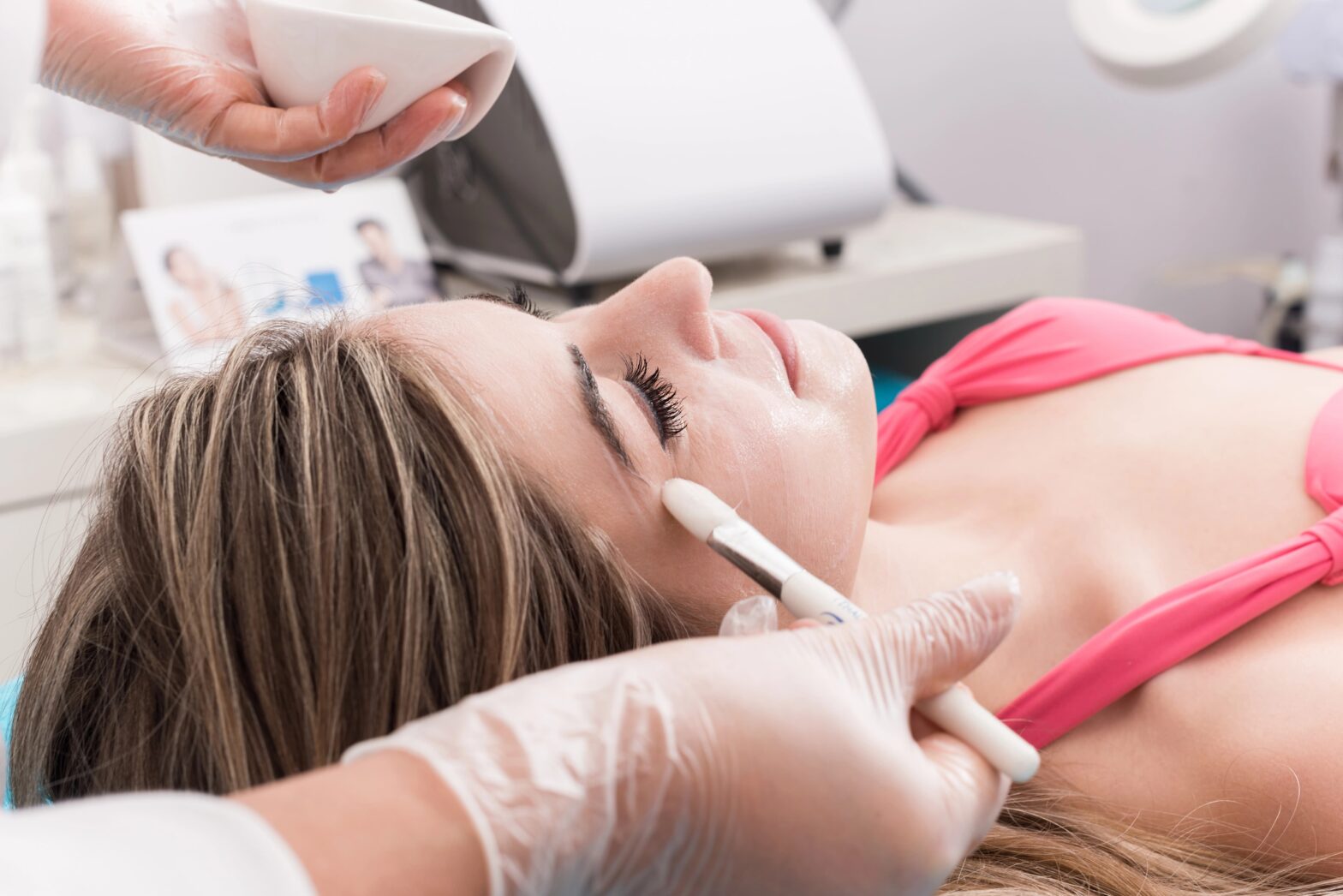Article At A Glance
- A chemical peel is a non-invasive treatment for patients looking to improve their facial texture and tone.
- While peels are effective, they may cause side effects and require consistent aftercare to ensure proper healing.

If you like the idea of noticeable skin rejuvenation without a lot of downtime or an arduous healing process, you might consider professionally administered chemical peels. These skincare treatments can make you feel like you’ve visited a spa with refreshing, youthful results.
However, you need specific skincare products and a consistent aftercare routine following a professional peel treatment. Dr. James C. Wang of Northwestern Memorial Hospital gives you the run-down on what to expect below.
What Is a Chemical Peel?
A chemical peel procedure involves an aesthetician applying an acidic formula to the top layer of facial skin. The acids induce chemical exfoliation by breaking down the top epidermal layers. However, the process doesn’t end in the clinic.
Your skin will recover and renew for a week following your peel appointment. It will constantly peel until it sheds the damaged layers. More intense peels penetrate deeper and remove more imperfections.
The treatment’s effectiveness means increased caution and care when preparing for and recovering from it. You can’t just dive into the treatment without obtaining the recommended products and caring for your skin as directed.
Chemical Peel Preparation 101
As with other cosmetic treatments, Dr. James C. Wang urges patients to get ready beforehand. Preparing for a facial peeling treatment often involves:
- Appropriate scheduling: Book your peel appointment two weeks before major events, especially those involving pictures. Your skin may still need time to heal.
- Avoiding irritants: Halt potentially agitating actions like waxing, exfoliating, and using harsh active ingredients a week before your appointment. Your skin needs ample time to recover from these routines to handle a peel session.
- Discuss your current skincare routine with your provider: Ask your doctor whether you can safely use your current products before and after the peel. Some products contain irritants that will prolong the healing process.
- Rescheduling if a breakout occurs: If you have an acne breakout or other epidermal flareup, consult with your doctor about rescheduling your appointment. Reactive skin often becomes stressed, and a chemical peel may cause further stress.
What To Expect Following Your First Chemical Peel
As mentioned, a successful dermatological peel heavily relies on proper, consistent aftercare. The following tips and your doctor’s personalized recommendations will help you maximize the results and minimize your recovery.
Caring for Your Skin
Like many beauty-savvy people, you likely have a well-rounded skincare routine. However, you should adjust it to suit occasional chemical peels and their effects. Your doctor might advise that you drop certain products to protect the skin’s surface.
They may also recommend specific products to promote healing and amplify the desired results. Use the recommended items alongside sunscreen daily. You should avoid cosmetics because they can hinder oxygen flow and cause further irritation.
If you don’t already have the following products, pick them up to supplement your recovery:
- Gentle, non-abrasive cleanser
- Deep moisturizer for twice-daily application
- Recommended ointments to promote healing
If you include store-bought exfoliants in your routine, skip them for a couple of weeks. Many stores sell scrubs and over-the-counter chemical exfoliants that can disrupt healing and increase your risk of infection and injury.
Awareness of Side Effects
Chemical peels cause side effects, including:
- Redness and sensitivity within the first hours after the treatment: Chemical peels penetrate deep into the top layers of the skin. The sensitivity occurs because of this penetration.
- Dryness, tightness, and swelling for the following day or two: The deeper layers prepare to shed, causing the dry, tight sensation.
- Peeling and flaking for the first two to three days: You’ll notice flaking as the topmost layers shed.
- Potential breakouts or skin darkening after three or four days: Chemical peels may also purge toxins from deep within the skin, causing reactions like breakouts and dark spots. However, these temporary traits should disappear soon.
- Gradual stabilization within five days to a week: Your skin gradually returns to normal, revealing the healthy, glowing skin beneath.
- Normal, glowing skin with occasional sensitivity: You might still struggle with mild sensitivity or reactions for the two weeks following the initial treatment.
These symptoms are common and play a prominent role in the exfoliation process.
Prepare for the Peeling
Wash your face with a mild cleanser, leaving off any makeup or extra products unless otherwise directed by your doctor. You want to avoid active ingredients that could cause extra sensitivity. You should also stock all recommended products in your medicine cabinet or on the bathroom counter.
Attend Your Follow-Up Appointment
After you successfully undergo and heal from the skin chemical peel, you should still attend your follow-up appointment. You might think your skin has recovered swimmingly, but your doctor could pick up on problems you missed. Sometimes, infections have insidious, frequently missed symptoms.
An ongoing issue could permanently harm your skin. Your doctor can:
- Recognize concerning symptoms
- Recommend prescriptions or over-the-counter products to combat them
- Adjust your subsequent peel treatments as needed
While these concerns rarely happen after a peel, they can still occur when you least expect them!
Book Your Next Session!
Finally, you might need additional treatment sessions to reap the full benefits of your peel regime. Most desired peel results last between two and six months, depending on the peel’s intensity and the ingredients used. Once that timeline closes, you might notice some of your previous concerns resurface.
Additional sessions renew your results and can help them last longer. Your provider can craft a plan based on the peel sessions, your recovery experiences, and how well your skin retains the results.
Book a Consultation With Dr. James Wang
Do you see a chemical peel in your future? Consult with Dr. James Wang to find out whether it suits your routine. Call 312-695-8182 to book an appointment and explore your options.
